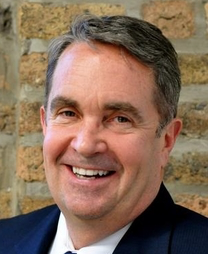
State: Ill.
Keefe: WC Reform Proposals to Get Our Claims Industry Out of Legislative Cross-Hairs: [2017-05-24]
We find it a bit puzzling that workers’ compensation reform continues to be such a focus of concern to the extent it is seen as a sticking point for our state’s budget.

Eugene Keefe
With the nation’s highest budgetary deficits and massive underfunding of state government pensions, it is our impression that tackling workers’ compensation reform in Illinois at this juncture is a bit like focusing on untangling a tiny knot in the dragon’s tail as he is about to breathe fire over the entire state.
However, as recent reports appear to show only modest savings from the 2011 statutory changes to the Illinois Workers’ Compensation Act, we offer two very simple, yet effective changes that would almost immediately bring Illinois workers’ comp costs back into the average of most of our sister states.
First, we recommend a return to the pre-2005 schedule for permanent partial disability values. Veteran observers of our industry will recall 11 years ago when our General Assembly found it prudent to actually increase the PPD values for injuries by 7% across the board. This was viewed as nothing more than an effort to further line pockets of claimants and their attorneys in a state that already had generous PPD or “settlement” values.
For a simple and unquestioned reform, returning to the former PPD schedule will save 7% on awards and settlements immediately. We don’t feel anyone on either side of Illinois WC would beef about that change.
Second, rather than developing a needlessly complex system of geo-zip fee arrangements or worse — Medicare-linked reimbursements for medical care that will drive great doctors out of workers’ comp — why not simply average the two or three largest group provider fee schedules and set that as the standard workers’ comp medical fee payment schedule? Doing so will allow doctors to be paid the same, whether treatment is under workers’ comp or group health. Moreover, this method would eliminate the financial incentive for doctors to drive claims into workers’ compensation to collect higher rates, as we have certainly seen some medical providers do over the years.
Adjustments can be made every three years to keep the average current with any group adjustments. Doctors make money from Humana and Blue Cross, and they would make the same treating workers’ comp claims, too.
Making these two simple changes, which we expect should be fairly easy to pass with both the governor’s and General Assembly’s approval, will save enough to make Illinois competitive again and also keep benefits adequate for our workers.
Where reform is right now in Springfield
Last week, the Illinois Senate's workers' compensation proposal received a new amendment. SB 198 (formerly SB 12) is essentially amendment 4 to SB 12 with two specific changes.
SB 198 adopts the Illinois Chamber of Commerce's recommended move from the current medical fee charge system to a resource-based relative value scale, effective Sept. 1, 2017. This is expected to cut WC medical costs in the area of 30% more than steep cuts made in 2005-6 and 2011.
In addition, the new amendment requires the Workers' Compensation Commission to investigate all procedures, treatments and services covered under law for ambulatory surgical treatment centers and accredited ambulatory surgical treatment facilities, and establish fee schedule amounts for procedures, treatments and services for which fee schedule amounts have not yet been established. These loopholes will close.
Gov. Bruce Rauner’s mixed-up efforts to reform or cut costs by changing our “causation standard,” redefining and possibly expanding the nutty “traveling employee” concept, and strengthening AMA guidelines in setting PPD or “permanency/impairment” are not part of this compromise. As we have reported repeatedly, Gov. Rauner doesn’t need legislation to make the changes. He can make such changes with his administrative/executive control of the IWCC and either doesn’t know or doesn’t care to do it.
If there are changes made as part of a “grand bargain,” it would appear that medical cost cutting is likely the extent of what will be considered the 2017 amendments to the Illinois Workers' Comp Act.
Then we hope Illinois workers’ comp reform would be off the table and our industry can go back to the normal challenges. We would love to see the governor and General Assembly tackle the monstrous, multi-billion dollar battles to cut government budgets and bring runaway spending into control before raising taxes so high that even more folks will be driven away from this state.
Eugene Keefe is a founding partner of Keefe, Campbell, Biery and Associates, a Chicago-based workers' compensation defense firm. This column was reprinted with his permission from the firm's client newsletter.